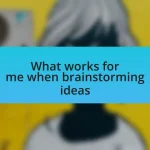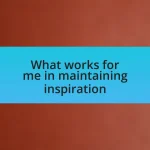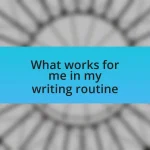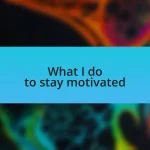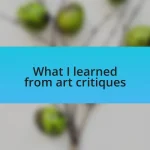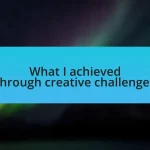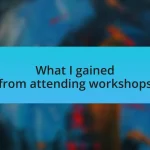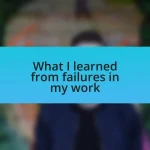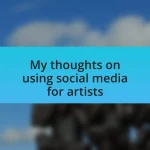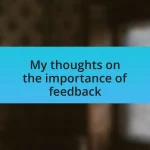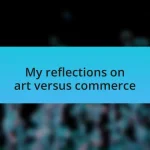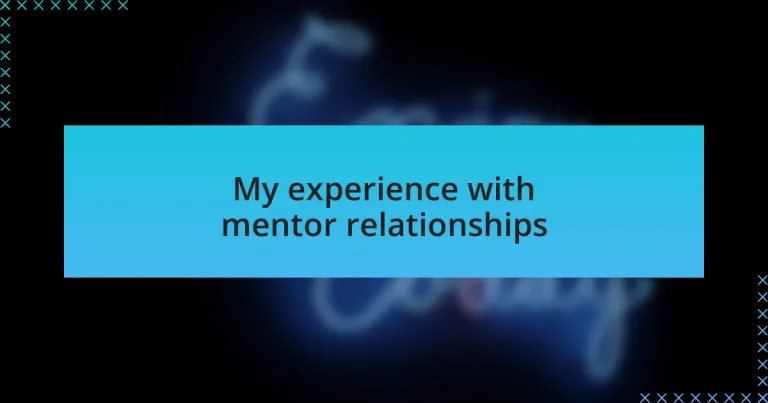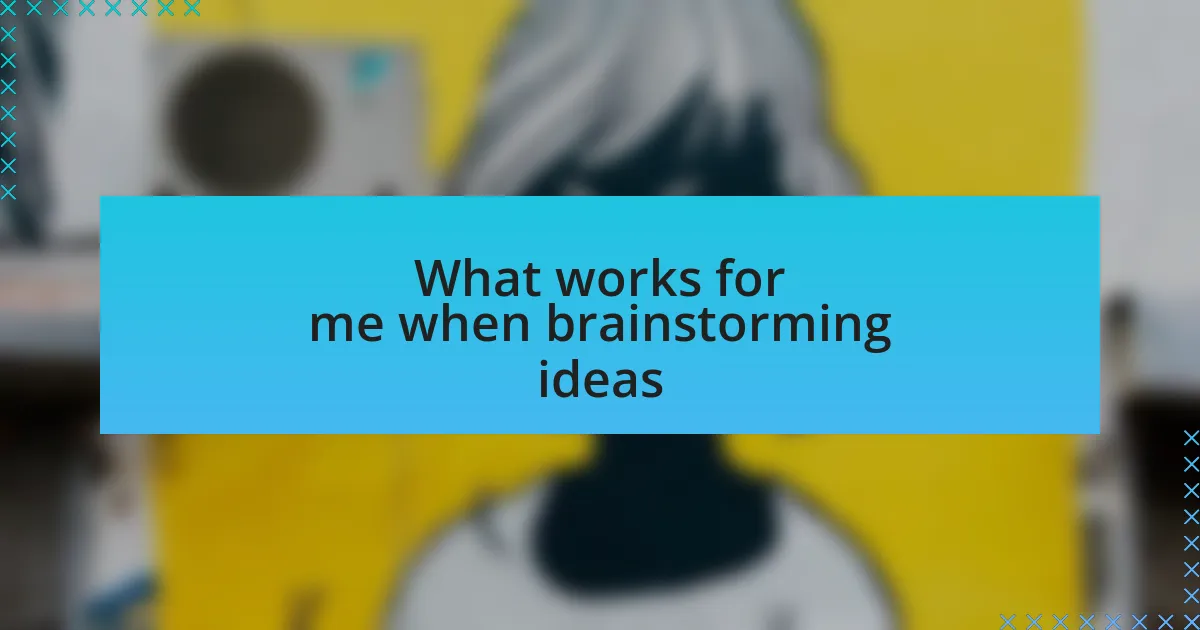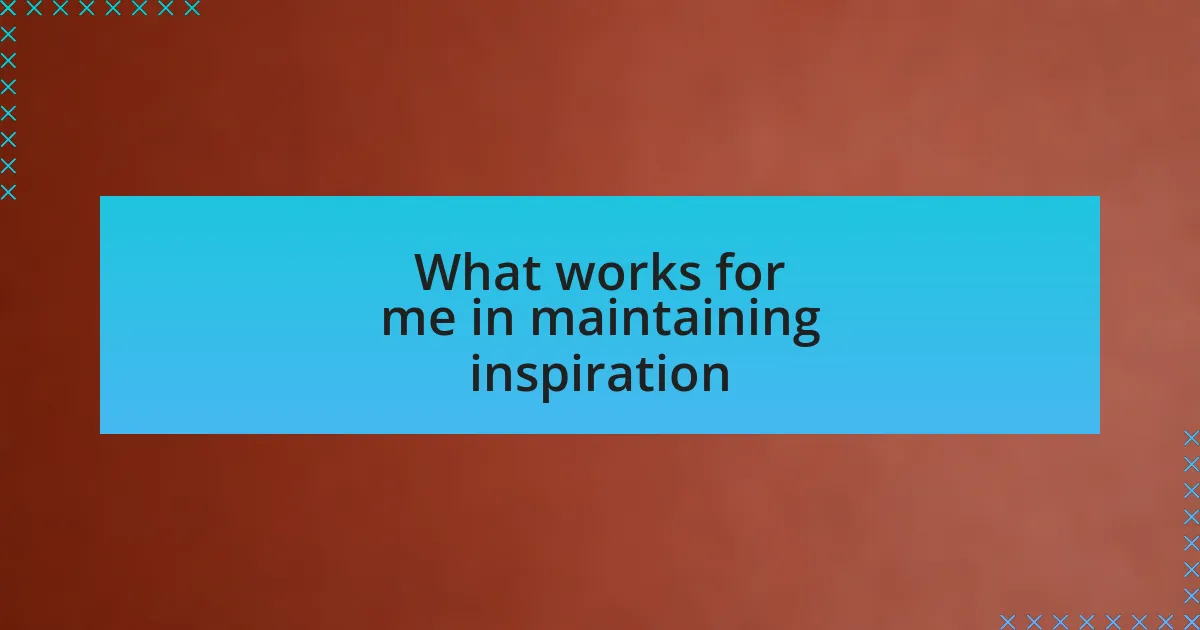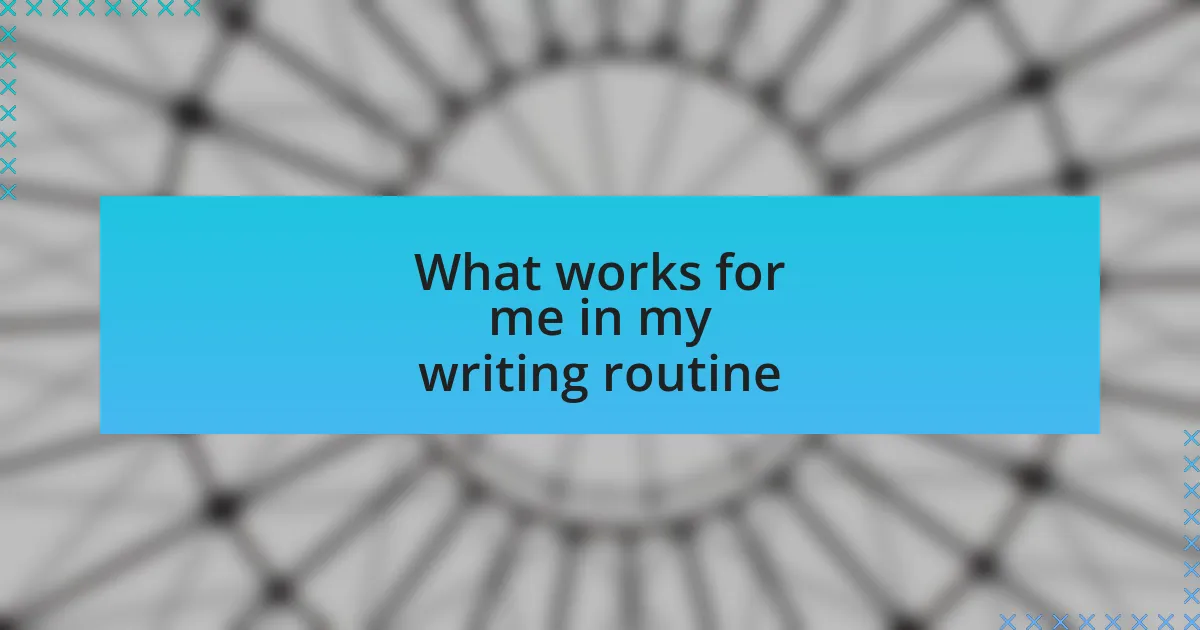Key takeaways:
- Mentor relationships are crucial for artistic growth, providing guidance, support, and inspiration during creative challenges.
- Open communication and trust are foundational to building strong mentor-mentee connections, enabling mutual development.
- Embracing vulnerability and sharing experiences fosters deeper understanding and collaboration, enhancing the creative process.
- Learning to accept constructive feedback and valuing the artistic journey over quick results are essential lessons from mentorship.
Author: Clara Whitmore
Bio: Clara Whitmore is an acclaimed author known for her evocative storytelling and richly detailed character development. With a background in literary studies, she weaves themes of identity and resilience into her work. Clara’s debut novel, “Echoes of Yesterday,” was met with critical acclaim and has been translated into multiple languages. When she’s not writing, Clara enjoys exploring the great outdoors and immersing herself in diverse cultures. She currently resides in Portland, Oregon, where she is working on her next novel.
Understanding mentor relationships
Mentor relationships can be some of the most enriching connections in an artist’s journey. I remember my first mentor, who not only provided constructive feedback on my work but also encouraged me to embrace my unique style. It made me think: how often do we overlook the importance of having someone guide us through our creative challenges?
Building a mentor relationship often requires vulnerability. I shared my fears and doubts with my mentor, which helped me grow not just as an artist but as a person. Have you ever opened up to someone about your struggles? It can be daunting, but that sharing often leads to profound insights and support.
These relationships are not always about direct instruction; sometimes, it’s about witnessing their journeys and absorbing lessons from their experiences. I learned invaluable skills simply by observing how my mentor navigated the art world. This made me wonder—how much can we learn from the unspoken actions of those we admire?
Importance of mentorship for artists
Mentorship can serve as a vital lifeline for artists, offering both guidance and inspiration. I vividly remember a moment when my mentor introduced me to a local art community. That single connection opened doors I never knew existed, allowing me to build relationships and gain exposure. Have you ever encountered a situation where a simple introduction changed your trajectory completely?
Having a mentor means having someone who believes in your potential, sometimes even more than you do. There was a time when I doubted my abilities and questioned whether I belonged in the artistic space. My mentor’s unwavering encouragement pushed me to explore new techniques and step outside my comfort zone. Isn’t it fascinating how a few kind words can spark the confidence needed to take significant risks in our art?
Moreover, mentorship often creates a safe space for collaboration and experimentation. One project I worked on with my mentor allowed us to blend our styles, leading to something entirely unexpected yet beautiful. This experience helped me realize that mentorship goes beyond individual development; it fosters a creative environment where innovation can thrive. What collaborative opportunities have you experienced that reshaped your artistic approach?
Building a strong mentor relationship
Building a strong mentor relationship starts with open communication. I remember feeling nervous when I first reached out to my mentor, unsure of how to express my needs and goals. But as we talked, I found that honesty about my aspirations helped us align our visions. Have you ever felt that clarity from a meaningful conversation? It can make all the difference.
Trust is another cornerstone in mentoring. I recall a time when my mentor shared their own struggles and setbacks, which made me realize that even the most successful artists face challenges. This vulnerability created a bond between us, allowing me to feel safe discussing my own fears and doubts. The more I opened up, the more guidance I received. How well do you know your mentor’s story?
Lastly, a mentor relationship thrives on reciprocity. As I learned from my mentor, I also sought ways to contribute back, whether it was sharing my unique perspective or assisting them on projects. This reciprocity fostered a collaborative spirit that enriched our connection and made each session not just about my growth, but about mutual development. Have you thought about what you bring to the table in your mentorship?
Identifying the right mentor
Finding the right mentor is crucial for your personal and professional growth. I still remember the moment I met my first mentor at an art exhibit. There was this immediate spark; our discussions flowed effortlessly, opening new perspectives and creative avenues. Have you ever experienced that kind of connection with someone? It’s those shared passions that can lead you to the mentor who truly resonates with your artistic journey.
It’s also important to consider what you hope to achieve with a mentor. I learned this when I met a mentor whose focus was on digital art, while my interests leaned toward traditional mediums. Initially, I felt hesitant about whether they could guide me effectively. But it turned out that the principles of creativity and execution transcended the medium. Have you thought about how aligning goals and visions can impact your learning experience?
Lastly, look beyond the surface when identifying a mentor. While accolades and experience matter, I found that personality and mentoring style should match your own. Some mentors are hands-on, while others take a more laid-back approach. Reflecting on my journey, the mentors who truly stood out were those who understood my unique voice and encouraged me to embrace it. What qualities do you value most in a mentor?
Navigating challenges with mentors
Navigating challenges with mentors can often feel daunting, especially when expectations don’t align. I recall an instance when my mentor and I had a disagreement over a project direction that I felt strongly about. Instead of backing down, we engaged in an open dialogue that revealed deeper insights into both our perspectives. It was a learning moment; I realized that addressing conflicts constructively only strengthens the mentor-mentee relationship.
Sometimes, it’s easy to get caught up in the perceived authority of a mentor and forget the value of our own voice. I encountered this when my mentor suggested an approach that didn’t resonate with my artistic identity. Initially, I found it hard to express my discomfort, fearing it would strain our relationship. But once I expressed my thoughts, it transformed our dynamic, leading to richer discussions that honored both my vision and their expertise. Have you ever hesitated to speak up, only to discover the power of your own ideas?
Mentoring relationships can also come with unexpected challenges, such as differing communication styles. Early on, I struggled with my mentor’s preference for written feedback, while I was accustomed to verbal exchanges. This difference almost created a barrier. However, I adapted by scheduling regular check-ins, which improved clarity and connection. Have you faced challenges like this in your own experience, and how did you navigate them? Embracing these hurdles often leads to greater understanding and personal growth.
My personal mentor experience
My mentor experience has been a whirlwind of insights and surprises. One moment that stands out was during a particularly creative block. I felt completely stuck, doubting my abilities as an artist. My mentor saw through my struggle and suggested we take a walk outside to clear my mind. That simple act of stepping away from the canvas allowed me to regain perspective and reignite my passion. Have you ever had a similar moment where a change of scenery shifted your mindset?
In another instance, my mentor shared her own failures with me, which was incredibly eye-opening. Hearing about her journey, including the setbacks she faced, made me realize that even experienced artists face obstacles. It felt reassuring to know I wasn’t alone in my challenges. It sparked a deeper connection between us, allowing me to share my fears without judgment. Have you ever found comfort in someone else’s vulnerability?
I also learned how important it is to embrace feedback, even when it stings. During one review session, my mentor critiqued a piece I poured my heart into, pointing out areas that needed improvement. My initial reaction was defensiveness; I felt my artistic vision was under attack. However, as I reflected on her comments, I recognized that her insights were meant to help me grow. This shift in perspective—seeing criticism as a stepping stone rather than an obstacle—has transformed my approach to art. How do you handle constructive feedback when it feels personal?
Lessons learned from my mentor
During my journey with my mentor, I learned the value of patience. There was a time when I wanted to rush through a project, eager to showcase my skills. My mentor reminded me that artistry isn’t just about the end result; it’s about the process. “It’s the journey that shapes the work,” she said, instilling in me a deeper appreciation for the time and effort that cultivating my craft demands. Have you ever felt the pressure to produce quickly, only to realize that taking your time often leads to better outcomes?
Collaboration was another significant lesson. I vividly remember a group project where I hesitated to share my ideas, fearing they wouldn’t be good enough. My mentor encouraged me to express my thoughts, and when I did, I discovered that our combined creative energies resulted in something far stronger than I could have achieved alone. This experience taught me that collaboration can unlock new dimensions in art that may remain hidden in isolation. How often do you hold back in collaborative settings, unsure of how your ideas might blend with others?
Trusting my intuition was another profound takeaway from my mentor relationship. On one occasion, I doubted my choice of color for a piece, seeking my mentor’s approval. Instead of giving me a direct answer, she asked what my instincts were telling me. This nudged me to reflect on my artistic voice. Ultimately, I went with my gut, and the result was a piece that resonated deeply with both me and my audience. Have you ever struggled to honor your instincts in your creative work?
